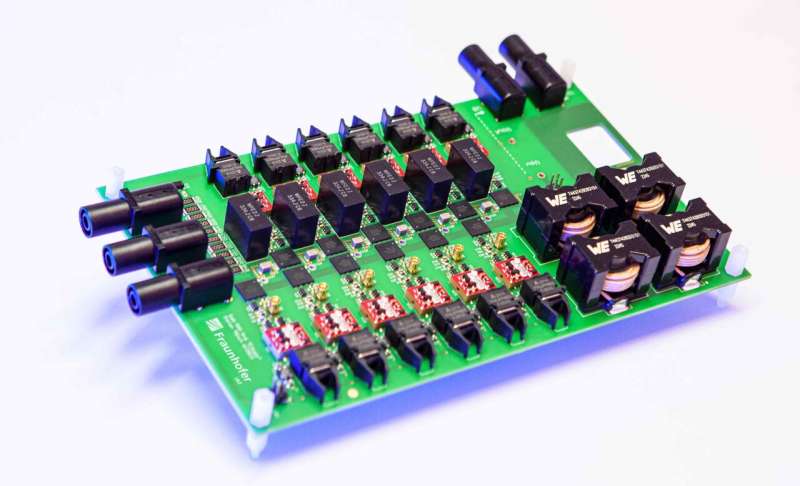Power electronics for novel heat pumps achieves efficiency of more than 99.7%

In the Fraunhofer lighthouse project ElKaWe, researchers are working on the development of electrocaloric heat pumps as an alternative to the currently prevailing compressor technology. These new types of heat pumps promise higher efficiency and do not require refrigerants.
Researchers at Fraunhofer IAF have now reached a milestone in power electronics: They have realized an ultra-efficient circuit topology for voltage converters with more than 99.74% electrical efficiency. This result is a worldwide benchmark and an important step on the way to more efficient solid-state heat pumps. The results are published in the IEEE Journal of Emerging and Selected Topics in Power Electronics.
Heat pumps are extremely efficient systems for heat generation and a central component of the heat transition. To increase the efficiency of heat pumps, researchers in the Fraunhofer lead project “Electrocaloric Heat Pumps,” or ElKaWe for short, are working on new types of heat pumps that do not require compressors and are expected to achieve higher efficiencies in the future.
Due to their technology, today’s heat pumps achieve only about 50% of the physical Carnot limit, while the electrocaloric heat pump can theoretically achieve 85%. But how efficient electrocaloric heat pumps ultimately are also depends to a large extent on the efficiency of the integrated power electronics.
Ultra-efficient power electronics due to gallium nitride
In the ElKaWe project, the Fraunhofer Institute for Applied Solid State Physics IAF is in charge of developing the drive electronics for electrocaloric heat pumps. For this purpose, the institute is researching devices based on the semiconductor gallium nitride (GaN) in order to increase power density and efficiency.
For the first time, the researchers have now developed and optimized power electronics specifically for electrocalorics. They have succeeded in implementing an ultra-efficient circuit topology for voltage converters based on GaN transistors, achieving an electrical efficiency of 99.74% in the electrical power path. The GaN-based multilevel DC/DC converter thus sets global standards and far exceeds the previous state of research of less than 90% conversion efficiency for electrical control of these novel heat pumps.
More efficient electronics provide more efficient heat pumps
The significant increase in efficiency of the drive electronics has a direct effect on the coefficient of performance of the entire system. Until now, electrocaloric heat pump systems were limited by the losses of the electronics, among other things. The increased electrical efficiency leads directly to a higher coefficient of performance of the entire heat pump system and is thus a milestone on the way to more efficient heat pumps.
“Our ultra-efficient power electronics make it realistic for the first time to achieve well over 50% of the maximum theoretical coefficient of performance with electrocaloric heat pumps, even at the system level. There is still a lot of research to be done, but in [the] future this technology could become a more efficient and completely emission-free solution for heating and cooling,” says Dr. Stefan Mönch, researcher in the field of power electronics at Fraunhofer IAF.
“Essential for realizing a high coefficient of performance of electrocaloric heat pumps is a very high efficiency in materials, electronics and heat transfer. If you get all this under control, electrocalorics has enormous potential,” adds Dr. Kilian Bartholomé, project manager of ElKaWe and researcher at the Fraunhofer Institute for Physical Measurement Techniques IPM.
The principle behind the electrocaloric heat pump is the electrocaloric effect: If an electrical voltage is applied to an electrocaloric material made of special ceramics or polymers, the material heats up. As soon as the voltage is removed, the material cools down again, and the entire process is almost completely reversible.
Since the electrocaloric materials form an electrical capacitance, the power electronics in the system has the task of electrically charging and discharging the electrocaloric capacitances several times per second as highly efficiently and thus as loss-free as possible, with heat being pumped in each cycle.
The results were obtained as part of the Fraunhofer lighthouse project ElKaWe. In this project, researchers from six Fraunhofer Institutes are investigating electrocaloric heat pumps for heating and cooling. Led by Fraunhofer IPM, they are developing electrocaloric heat pumps that enable particularly efficient heat dissipation, and do not require compressor technology and refrigerants. The goal of the project work is to demonstrate the potential of the technologies for future efficient and emission-free heating and cooling applications.
More information:
Stefan Mönch et al, A 99.74% Efficient Capacitor-Charging Converter using Partial Power Processing for Electrocalorics, IEEE Journal of Emerging and Selected Topics in Power Electronics (2023). DOI: 10.1109/JESTPE.2023.3270375
Provided by
Fraunhofer Institute for Applied Solid State Physics IAF
Citation:
Power electronics for novel heat pumps achieves efficiency of more than 99.7% (2023, July 20)
retrieved 20 July 2023
from https://techxplore.com/news/2023-07-power-electronics-efficiency.html
This document is subject to copyright. Apart from any fair dealing for the purpose of private study or research, no
part may be reproduced without the written permission. The content is provided for information purposes only.
For all the latest Technology News Click Here
For the latest news and updates, follow us on Google News.
